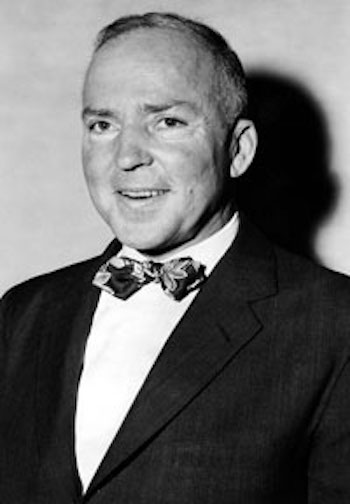Editor’s note: This column contains discussion of sexual abuse.
Kurt Meyer writes a weekly column for the Nora Springs – Rockford Register, where this essay first appeared. He serves as chair of the executive committee (the equivalent of board chair) of Americans for Democratic Action, America’s most experienced liberal organization.
Two decades ago, I became dimly aware of the poet Richard Eberhart. Not because of anything he had written or done recently to breach my knowledge gap. Rather, because he was from Austin (Minnesota), as was Dad’s family. Despite his minimal interest in poetry, it was Dad who first brought Eberhart to my attention, logical in light of their shared Austin background.
My curiosity piqued, I began investigating. “Who’s this famous poet… from AUSTIN?”
Eventually, I started seeking and buying Eberhart books. I’m not the world’s only Eberhart collector, but there aren’t too many of us. Like other authors I’ve gone deep on – my current literary “Rushmore” includes Garland, Ferber, Manfred, and Stegner – I feel a kinship with Eberhart. He was born in Austin because his father was employed at Hormel’s.
This same statement is applicable to both Dad and me, since for decades Grandpa and Dad held blue-collar jobs at the plant. By the time Richard was born, 1904, his father’s name was on company stationery (corporate secretary), the only officer not named Hormel.
Eberhart’s children, Dikkon and Gretchen, have both written memoirs, which accompanied me on a recent family vacation. Dikkon’s (2015) is entertaining and, despite bleak moments, is marginally lighter. Gretchen’s (2020) is gripping and disturbing, due to the sexual abuse she endured from her father.
That’s right, Richard Eberhart, my poet, the guy whose books I’ve collected for two decades, sexually abused his (then) teenage daughter.
I connect with several aspects of Gretchen Cherington’s story, Poetic License (thankfully, not the assault part): a summer spent in Owatonna, working with migrants at Owatonna Canning Company, where I worked the summer of 1973; a conversation with her next-door neighbor, John Hennessey, Hanover, New Hampshire, who I met and worked with 40 years ago; her opening sentence in Chapter 22: “The stories my father told me about growing up in Austin, Minnesota, were the ones I loved the most.”
Nevertheless, the primary arc of Cherington’s book is the foreshadowing of abuse, the abuse, and then, its aftermath.
Sexual abuse has a remarkably long tail. Cherington strives mightily to deal with her father’s narcissism; his late-life affair (evident in Eberhart’s papers, which Cherington laboriously sorts through); his complex relationship with his wife, his contemporaries, and his children.
Meanwhile, in one telling vignette in Dikkon’s book, he argues with his father about Richard’s failure to visit Ezra Pound in prison, rooted in political and philosophical differences between two gifted poets.
Dikkon: “You could have gone to see Pound for ‘The Cantos’. You love the ‘The Cantos’.”
Richard: “I just couldn’t… he was a fool.”
Dikkon: “Okay I get it about his politics. But can’t you separate the man from his work?”
(Then later…)
Richard: “We’re all of a piece, Dikkon. That’s what we are. I couldn’t go see Pound because I couldn’t go see Pound.”
Literally on his death bed in 2005, Gretchen forgave her father. After circumnavigating the triggering assault episode for five decades, the #MeToo movement helped Cherington go public with her story. She’s a candid, strong, resilient woman; her well-written book is worth reading on multiple levels.
I remain haunted by several responses to her abuse saga. From poet Don Hall, “I can’t say I’m surprised. He used to ‘French-kiss’ my first wife.”
And from neighbor, the late John Hennessey, “The way your father looked at you just wasn’t right… not as a well-loved child, but more as an object. It was troubling to both (my wife) Jean and me. It was uncomfortable to watch.” (Then, later in this conversation) … “I can’t say I’m surprised.”
Richard Eberhart was a complex, compelling character, with outsized talents and equally significant flaws. At his best, Eberhart poems are mystical, magical. His awards – basically, every prize available to a poet – are well deserved. Still, I wrestle with a variation of Dikkon’s question, can you separate the man from his work?
And, if his daughter can forgive, shouldn’t I? Clearly, I’m struggling. Maybe, given sufficient time…
Top photo of Richard Eberhart is public domain, from the Library of Congress.

